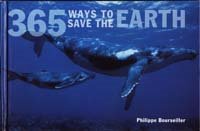Inspired Links

The Origin of 365 Ways...
I came across this amazing book by Phillippe Bourseiller when i was in Denmark close to a year ago:
"For the past 15 years, Phillippe Bourseiller has photographed nature from every angle: from the eruption of the volcano Pinatubo to the great deserts of ice and sand, he has captured the hidden colours and breathtaking lights of our planet.
But our contemporary way of life threatens this fragile beauty. To encourage more restraint, Philippe Bourseiller teams 365 photographs with a daily ecological action. Each of the initiatives is accompanied by facts and statistics that illustrate the threats to the environment posed by our behavious, and demonstrate the beneficial consequences of the recommended actions. Each day reveals the image of a wonder of nature along with the guidelines to preserve our planet. Through the pages of 365 Ways to Save the Earth, a truly ethical way of life takes shape."
Starting from today, i would like to post each inspiring page according to the days on the yearly calendar (supposed to start from jan, but...i'll catch up!). Hopefully, you'll look at everyday a little differently after this...
Blog Archive
-
▼
2007
(28)
-
▼
January
(10)
- Leisure - Be environmentally aware when taking par...
- Agriculture - Make it a rule to buy organic for a ...
- Consumption - Buy recycled
- Water - Use less water when flushing the toilet
- Waste - Encourage your place of work to start comp...
- Energy - Improve the efficiency of your radiators
- Energy - Buy 'green' electricity
- Forests - Recycle Christmas trees and cards
- Energy - Turn down your heating by 1 deg Celcius
- Agriculture - Buy Fair Trade products, and help co...
-
▼
January
(10)
Saturday, January 6, 2007
Waste - Encourage your place of work to start composting waste
Organic household waste can be converted into compost, a natural fertiliser that will increase the soil's ability to retain air and water, check erosion and reduce the need for chemical fertilisers. The compost is produced by the action of the micro-organisms present causing the waste to break down and decompose, one kilogram of organic waste produces around 300 grams of compost.
_____________________________________________________________________
The composting of organic waste can benefit the whole community. Take the initiative and approach your children's school canteen or the kitchen at your workplace, and explain the ecological and economic advantages of composting waste. Even if they do not decide to compost waste, it might encourage them to think about the amount that is thrown out and come up with alternative solutions to the problem.
Subscribe to:
Post Comments (Atom)
About Me
- cnmmnc
- Who am i? What i say doesnt matter..What i have done? That makes me.

No comments:
Post a Comment